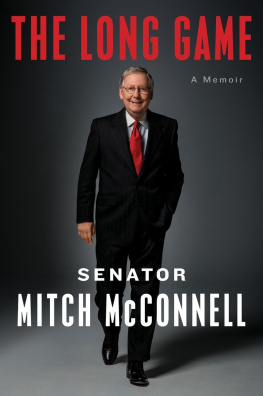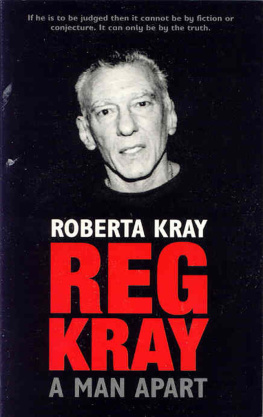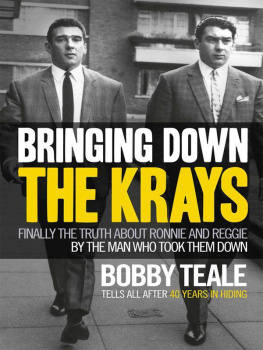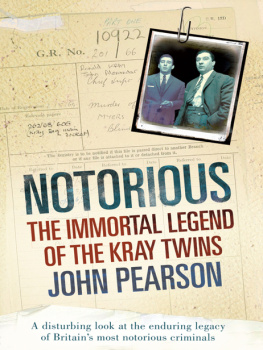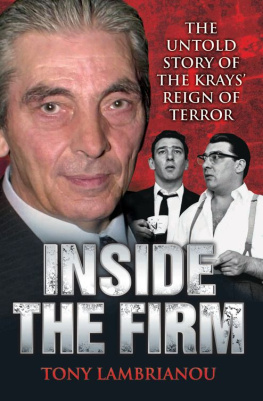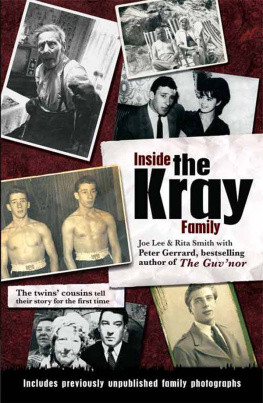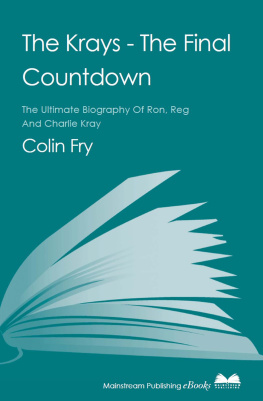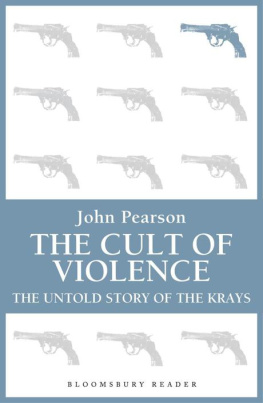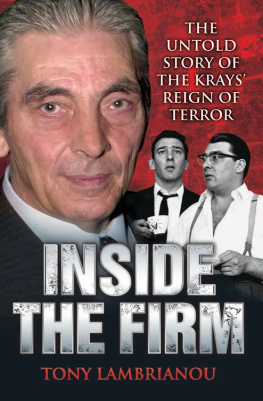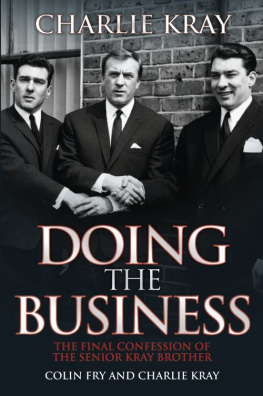The Rise and Fall of the Brothers Kray
Brian McConnell
Brian McConnell, 1969
Brian McConnell has asserted his rights under the Copyright, Design and Patents Act, 1988, to be identified as the author of this work.
First published in 1969 by David Bruce, and Watson Limited.
This edition published in 2018 by Lume Books.
Table of Contents
Chapter One
Cockneys, whatever the history books say, are descended from Caesars Roman legions. And they have been playing the old soldier ever since.
Whilst Julius Caesar was busily making a start on what was much, much later to be finished off as the Tower of London, laying stone on impregnable stone to cow the local barbarian males, his more combatant troops were equally busily laying their women. Behind the ramparts and through the woods they bred the forebears of this race apart, a tribe with a natural and necessary herding instinct which has remained intact for nearly two thousand years.
Whenever a legionary was recalled to Rome, or dispatched to some far flung battlefield of the Roman Empire, he would, as like as not, leave behind him in London a daughter ready and willing to bear his successors one or more members of the next generation.
Without the Romans there would have been no London and no Londoners. The ancient Britons were too crude and unskilled to build a capital then, and later the Saxons were too busy with their destructive wars. But into the blood of a particular batch of British barbarians the Romans injected their characteristics of superiority and excess, and four hundred and fifty years of Roman occupation of British beds finally ensured that there would be a lasting lineage of Londoners with particular and peculiar tendencies.
They could never leave the urban civilisation the Romans gave them, for they would be lost without companionship of their own kind, without food, and without work. And who, today, has ever heard of a Cockney willingly leaving Cockneyland? What was once a necessity has become nature.
They are conformists. Everyone, everywhere else, is out of step with them. Yet to the rest of the world the Cockney is the greatest nonconformist of all. He has the racial sense of supremacy of the ancient Roman, the roughness of the ancient Briton, and the inbred violence of the Saxon. Put Cockneys together in their thousands into the microcosm that is known as East London and they are content. Take them out of their environment and they are foreigners to all about them. Try to enrich them with the material advantages of other peoples and places and they will give you no thanks. Try to convert them to the behavioural codes of others and they will rebel. Always, the Cockneys know best.
Born in London within the sound of Bow Bells which rang out from the Church of Saint Mary-le-Bow the daily retreat from work, the Cockney will die there. What was good enough for his father is good enough for him. He was, is, and will be forever a Cockney.
Originally, of course, the name was tossed at him, sneeringly, as a term of abuse by the hard-working tillers of the soil around London, the self-reliant countrymen who toiled to produce the townsmans food. A cockeney was useless; a cocks egg; the puny, yokeless and substandard thing sometimes produced by an ailing fowl. But the Cockney child, or cockered kid, spoilt by tradition and foolish as a result, wore the name with pride. Boy and man, the Cockney still does.
Large-scale incursions into his manor have not affected him much. The Cockney has always converted the incomer. The persecution of the Jew down the centuries has led many to join him in the East End, and Irishmen, fleeing from a starving, inhospitable land, together with provincial Englishmen desperate for work, have flocked into London in droves during the last two hundred years. But even when the newcomers accounted for one in three of the population of inner London they could exert no influence whatsoever upon the manners and morals of the oldest inhabitants of the British capital. So clannish is the Cockney that he has no real individuality. His voice is that of the stock, his behaviour is that of the pattern, and his loyalty is to the mob.
As a result, there never has been a genuinely famous Cockney in the sense that any ordinary group would say admiringly: Hes one of us. Few true Cockneys have ever attempted to achieve such eminence. If one did, he would be regarded as a flash upstart; and if he left the humble surroundings where he was born he would be an outcast.
Dick Whittington, the renowned Lord Mayor of London, who was called back to the city of his disappointment by the sound of Bow Bells, was never a Cockney in the first place. He came originally from Gloucestershire. Show business people from the restricted London ranks have been largely ephemeral successes. Charlie Chaplin, the great actor, and Herbert Morrison, the cunning but unsuccessful Labour leader, born to the south-east and the south-west of the Thames respectively, were never really Cockneys by the reference book definition. There is not even a certainty that Jack the Ripper, who murdered nine prostitutes in eighteen months, between 1888 and 1889, in the heart of Cockneyland, was a native of the East End of London.
But every rule has its exception, every pattern its break. Any group of people, closely knit, bound by written or unwritten conventions, must produce its freaks and eccentrics.
And such oddities, because they are the men who bite dogs, rather than the dogs who bite men, are of bread and butter interest to newspapers. So it came about that, many years ago, my colleagues and I first began asking: Who are the brothers Kray? Their activities in the East End of London, and limited to that area in those days, were the constant subject of tap room gossip, of fancy (or so we thought) rather than fact, of fiction for the legend rather than truth for the ledger.
So inviting were the tips, so tantalising the stories and so disappointing were the results that successive newspapermen gave up trying to confirm the tales told about these brothers. Searching, researching, interviewing, investigating, with the inevitable brick walls of silence and the blind alleys of fools errands at the end of it all made it a thankless task.
There came a time, though, when the goose chasing had to stop.
In 1964, official investigators with the brief of government and of authority began to take able short cuts in pursuit of the unofficial newspaper investigators who had the brief of freedom of speech. The official investigators, from two totally different branches of government, visited many newspaper offices up and down Fleet Street. And they came with the gipsys warning.
This caution is ever-present in the world of investigation, and there is no need to repeat it to the initiated. But if it had to be uttered the official investigator would say to the unofficial investigator: You have a duty as a citizen to tell me anything which you know, and to show me any documents in your possession, which might indicate that a crime has been committed. If you refuse to do so, or fail to do so, you may render yourself liable to prosecution under the law.
One rare hot summer day in 1964 the unspoken words of the gipsy were thick and close in the London air, on the edge of the city and out west in one of the suburbs.
That morning, two senior detectives from New Scotland Yard were ushered into the offices of the editors of several national newspapers; experienced newspapermen who didnt have to be given the gipsys warning. They had seen to it through the years that more than one murderer, more than one escaped prisoner, and countless other lawbreakers had been handed over to the police. They knew that citizenship with responsibility doesnt end in a newspaper office. It often begins there.


